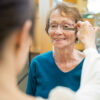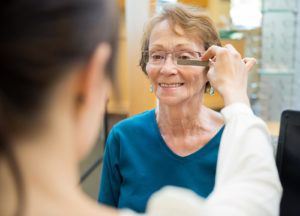
Eye Health Risks to Watch Out for in Aging Women
Getting older is something everyone faces every day. Unfortunately for aging women, developing a vision condition or disease is not uncommon in old age. The hard truth is that many more women than men will lose their sight as a result of aging and the various vision conditions they are likely to develop. So what’s the deal with aging women’s eye health?
It’s never too late to start taking care of your eyes, ladies! Because changing hormones can deeply affect our eyesight and health, it is extremely important to be aware of the risks that aging eyes face.
There are plenty of things to look forward to in old age, like retirement, reading all those books you never had time to read, spending time taking care of your children or grandchildren, taking up painting or sculpting, and the list goes on and on.
 However, all of these require sight. You won’t get to enjoy your retirement or your time with your kids, grandkids, nieces, nephews, or whoever because you’ll be worrying every day about your eyes.
However, all of these require sight. You won’t get to enjoy your retirement or your time with your kids, grandkids, nieces, nephews, or whoever because you’ll be worrying every day about your eyes.
Aging should be a breeze, not a chore. You’ve worked hard your whole life, now you want to sit back and relax. Well, we’d like that for you too, so let us take the worrying out of your eye health. Here are some of the biggest risks aging women face when it comes to their eyes:
Living with Low Vision
Far more women than men will have to live with low vision as they grow older. Low vision is often caused by a vision disease or condition that cannot be corrected with glasses or contact lenses. For example, age-related macular degeneration (AMD), glaucoma and cataracts are all conditions that could cause low vision in women.
Consequently, more women than men are likely to suffer from AMD and cataracts. Low vision often affects women above the age of 65, but a person may begin to show signs of low vision long before then.
Low vision is not the same as blindness. Someone who is blind will likely have a visual acuity measurement of 20/200 with 20/20 being the ideal vision. Blindness levels vary from person to person.
Low vision means you can see, but it’s as if someone had set a dimmer on your eyesight. Lights that used to be bright like your bathroom light will suddenly seem dull. Activities that require close attention like reading, sewing and cooking will become more difficult as you’ll begin to strain to see the little details.
Low vision is not a definite side effect to aging. Not all aging women will experience low vision, but it can be caused by other age-related vision conditions if they are not treated with the proper care. If you suspect you may have an age-related vision problem, contact your eye doctor immediately.
Living with low vision is no doubt a challenge, but it is not an impossible one. There is no corrective treatment for it at the moment. Instead, those with low vision have to adapt to their new vision.
For some, this means installing brighter lights in their home and creating lots of contrast. For example try using dark (preferably black) tape to mark important things like light switches, stairs, table corners, countertops, etc. The contrast between the dark tape and the bright lights will help you navigate easily.
Low vision is not blindness, so don’t treat it like it is. You can still see! Make the most of the vision you have!
Menopause and Women’s Eye Health
Everyone seems to absolutely dread menopause. For some, it’s because it’s a surefire sign of aging, and for others, it brings major, unwanted hormonal changes that can cause years of discomfort before the transition is over.
When menopause hits it brings with it a storm of hormones that can cause mood swings, hot flashes and a lot of general discomfort. Like pregnant women’s eyes, a hormone shift or imbalance can cause several vision conditions.
Research has shown that due to the falling levels of estrogen in menopausal women, they are more likely to develop eye diseases such as glaucoma and cataracts. It may also encourage the progress of AMD.
On the other side of the coin, lower testosterone levels in menopausal women can cause dry eyes. Testosterone normally regulates the salty solution around your tear film. Lower testosterone levels cause a lack of salty solution, which then brings on dry eyes.
To counter these eye conditions and diseases, doctors often recommend hormone therapy. Hormone therapy will increase your testosterone and estrogen levels to prevent them from affecting your vision.
If you are menopausal, it is recommended that you see your eye doctor once a year for regular checkups. Annual eye exams are the simplest ways to detect diseases early and prevent them. For diseases like glaucoma, which have no warning signs, annual eye exams are crucial. Just because you think your eyes are healthy, doesn’t mean that they are.
Dry Eyes
As mentioned, dry eyes are very common in menopausal women. Though dry eyes should subside with hormone therapy, sometimes they don’t. For those times we have a few natural remedies for aging women suffering from dry eyes.
For dry eyes, doctors will often prescribe certain medications to help the tear ducts produce tears. They may also suggest daily use of eye drops. While these are good solutions for some, they are temporary and tedious. If you happen to forget your drops one day, you are in for an annoying, uncomfortable outing.
For a more permanent result in treating dry eyes, try introducing lots of omega-3 fatty acids into your diet. These come in supplement form, but can also be found in foods like flaxseeds (and flaxseed oil); and fish (and fish oil). These acids are good for a myriad of health issues as you age, so your primary physician may also be glad you added them to your regimen!
Aging should be a fun process, not a worrisome one. By taking care of your eyes, you’re on the right track toward living happily ever after.
Our Rebuild Your Vision Ocu-Plus Formula Contains All 17 Vitamins, Minerals, and Herbal Supplements to Improve Your Eye Health!












Dry eyes can also come from Sjogren’s, so if it persists in spite of hormone adjustment, maybe it should be checked. If dry mouth accompanies dry eyes, it should be checked to see if it’s Sjogren’s.
I know. I have Sjogren’s, and had I been better about some aspects of self care, I would have been able to reduce stress, which is known to cause inflammation, and my immune system could have been healthier, and the Sjogren’s effects could have been less.
I’m realy happy to hear a solution to my eye dryness. I’ll be more careful about eating my flexseeds black cumin cinnamon cheese mix ture which ı usually have at breakfast. I hope I am doing the right thing. Thank you a lot. My regards